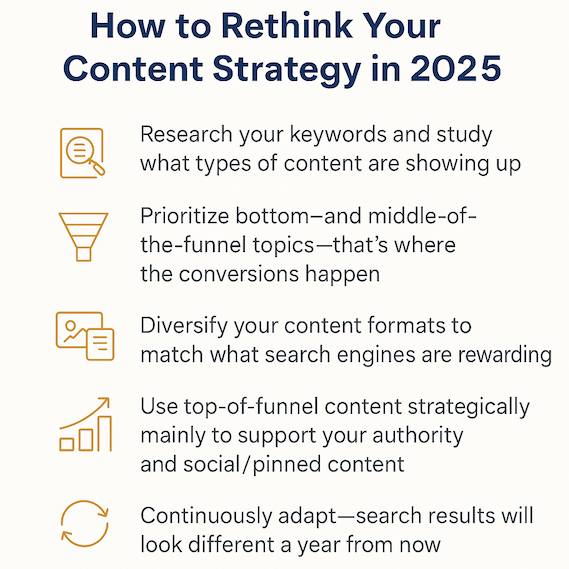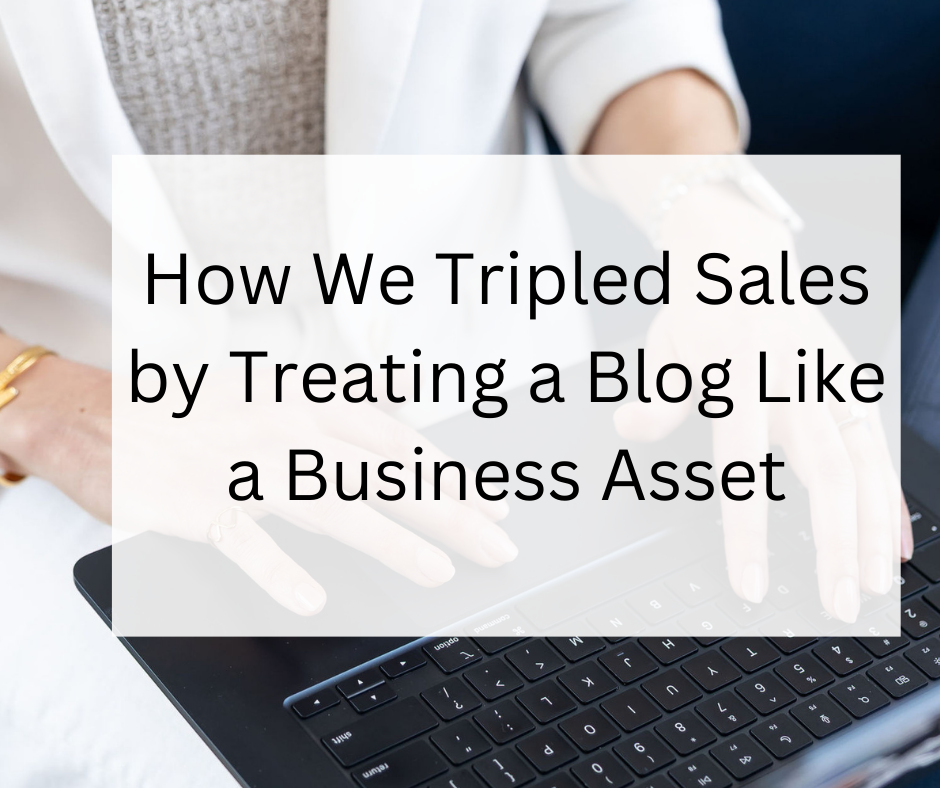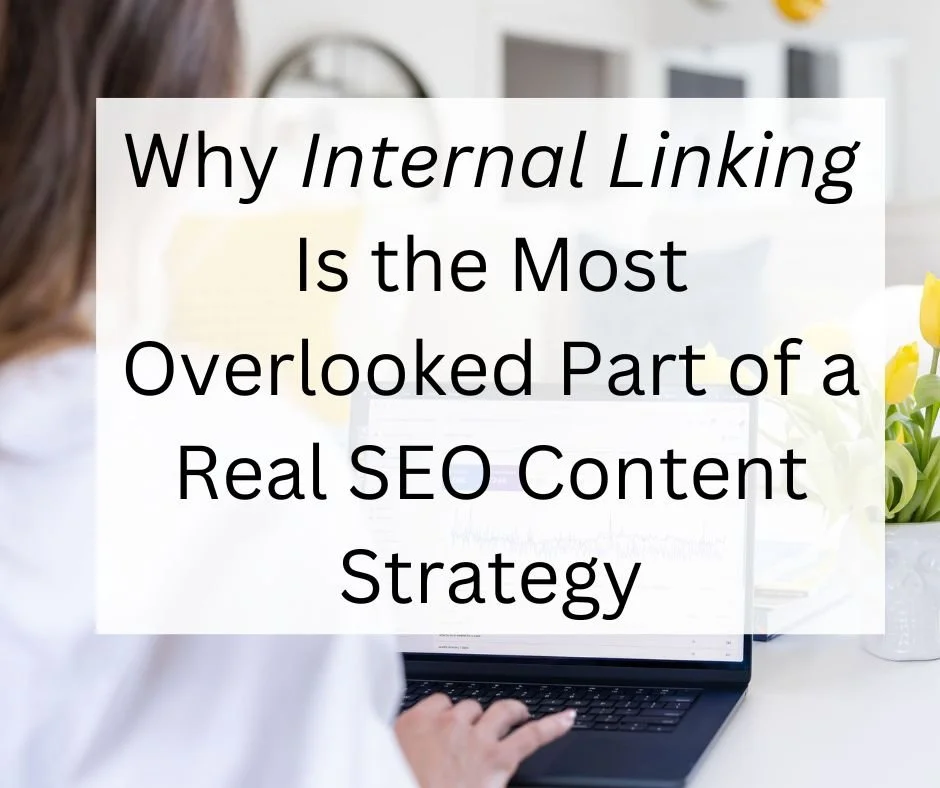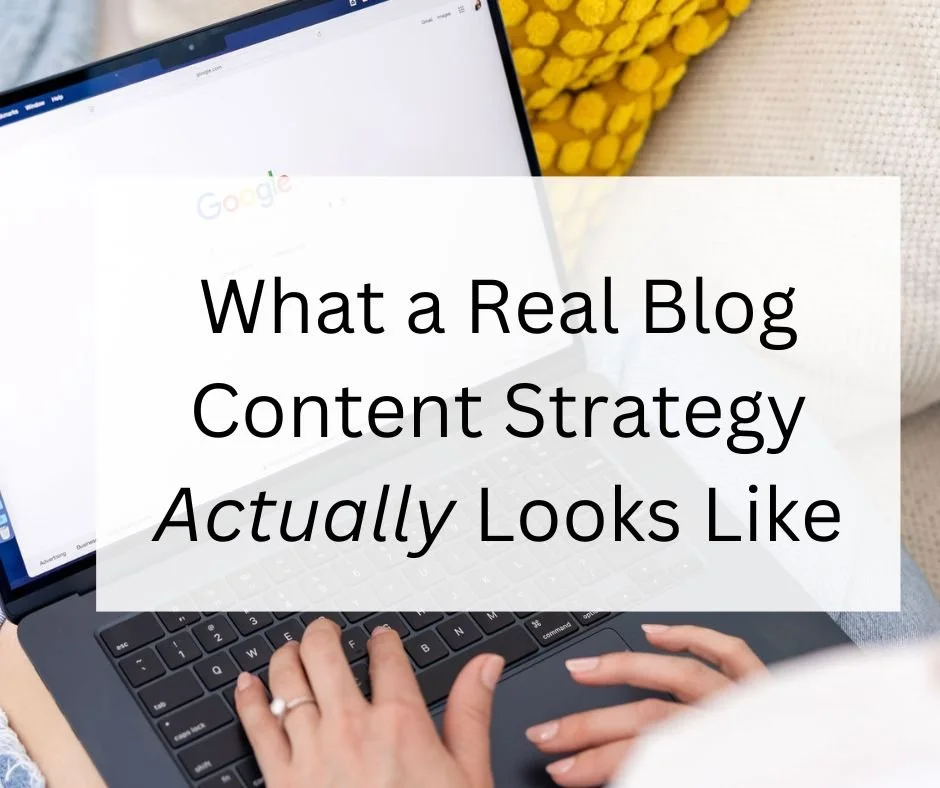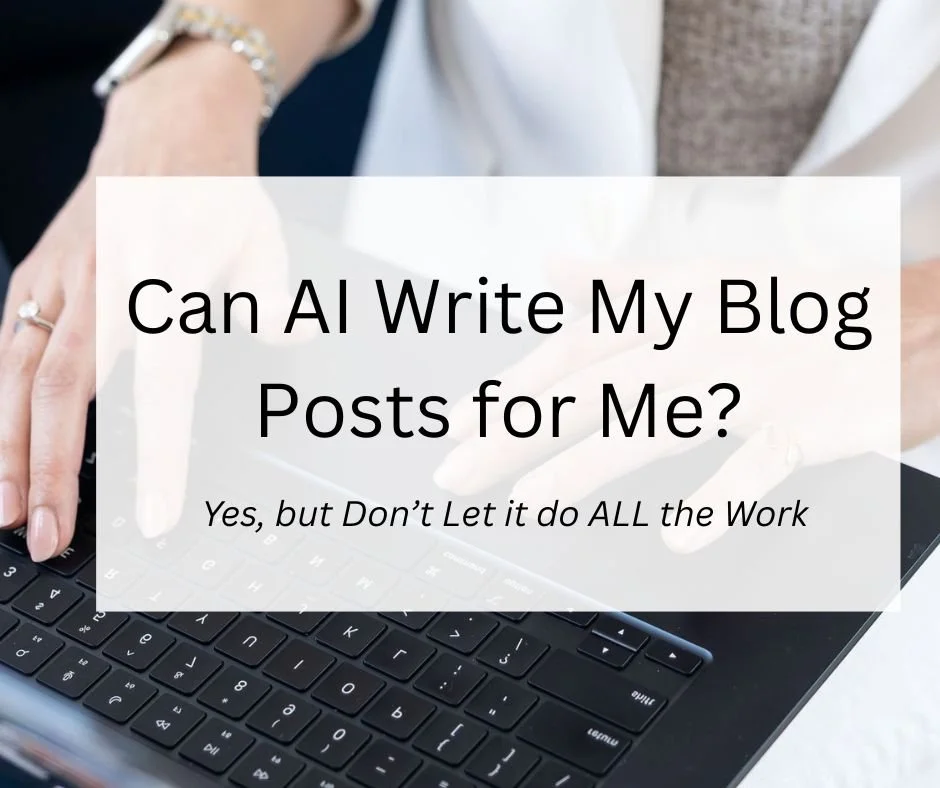How to Rethink Your Content Strategy (Now that AI is Taking Over Search)
Using blog content to show up in organic search results has been through it this year. There have been a LOT of changes. But some things aren’t changing. People are still searching online for your products, your services, and information.
But what is changing is how those search results appear, and who actually gets clicked.
And while a small group of people are asking their questions in tools like Siri or ChatGPT, studies show that nearly 90% of searches are still happening on Google. So let’s focus on that.
What’s Going On With Google?
Despite the rise of alternative search tools like Siri and ChatGPT, nearly 90% of searches still happen on Google. That hasn’t changed. But what has changed is what people see when they search.
One of the biggest shifts in the past year is the rise of the AI Overview. And now, AI Mode.
AI Overviews are those blocks you’ve probably seen at the top of search results, where Google gives you an instant answer to your question. These used to show up mostly for quick, informational queries. But now? They’re being tested and rolled out for more and more types of searches, some of which used to drive tons of organic traffic.
What’s new is AI Mode, Google’s built-in large language model (LLM) experience right inside Search. It’s essentially an expansion of the AI Overview. You’ll be able to ask follow-up questions directly in the search interface and get more conversational, dynamic responses. It’s designed to help users keep digging without leaving Google at all.
What does that mean for your content? In many cases, users are getting all the information they need without ever clicking on a single website. That’s where we’re seeing click-through rates drop because even if you rank, you're not necessarily being seen.
But there’s a silver lining.
If the query is more complex, like something that needs visuals, deeper explanation, or real human opinions, people still click through. Especially if they’re tech-savvy enough to know that AI can sometimes get things wrong. This is where you can still show up and win traffic. If your content is well-structured, helpful, and aligned with the searcher’s intent.
Understanding what kind of content AI handles well versus what requires more human input is a key part of building your content strategy in 2025.
It's Not Just AI. Search Is Changing in Other Ways Too
Even before AI Overviews, Google started layering different types of content into the top of the results page.
Now your blog post isn't just competing with ads. It’s also competing with:
Long YouTube videos with how-to walkthroughs
Short-form TikToks and Reels
Infographics and image carousels
Reddit threads and forum discussions
Even if you’ve earned that coveted #1 ranking, your blog might be buried under a pile of “more engaging” content formats. It’s no wonder you’re wondering why your blog is no longer ranking the way it used to.
So what do you do about it?
You Need a Smarter, More Strategic Content Strategy in 2025
Let’s figure out how to prioritize.
1. Focus First on Bottom-of-the-Funnel (BOFU) Content
This is the content that converts. People are ready to take action, but they just need to choose who to go with.
If you’re a local landscaper, this is content like:
“Best landscaping company in [city]”
“Affordable backyard design services”
“Hardscaping vs softscaping: which is right for me?”
This is the highest return content. Start here. These can be service/product pages or blog posts depending on your business.
2. Build Out Middle-of-the-Funnel (MOFU) Content
Next are the people who are still evaluating. They’re doing deeper research, comparing services, reading reviews.
Give them:
Case studies
Comparison guides
Answered objections
FAQs with schema markup
This helps your visibility and your conversions.
3. Don’t Abandon Top-of-the-Funnel (TOFU) Content, But Use It Differently
This is where a lot of people ask, “Is blogging even worth it anymore?”
And the answer is: it depends on your goals. TOFU content might not drive massive organic traffic anymore, but it’s still valuable.
It can:
Build topical authority for Google
Give you content to promote via social media or email
Get featured in AI Overviews (if written well and structured smartly)
Help users once they are on your site
Support an email, YouTube, or Pinterest strategy
So no, don’t toss your blog. But make it a supporting player, not your only strategy. And if you want your blog to show up in the search results, make sure to optimize for it.
But How Do You Know What Type of Content to Create?
You need to look at the SERPs for your target keywords.
Seriously, just Google the keyword you want to rank for and study what shows up:
Are there AI Overviews?
Are videos ranking above the fold?
Is Reddit taking over?
Do you see image packs or infographics?
If so, your content needs to show up in those formats, not just as a blog post. This is how you rank in 2025-2026. You go beyond the blog.
So if you’re writing that post about the “best bushes for Pacific Northwest gardens,” don’t stop at a blog. You could also (depending on what the SERPs are showing at the time, create:
A YouTube video
An infographic
Post a Q&A answer in relevant forums
Design a clean infographic for Pinterest
Add schema so you have a shot at AI inclusion
Once you know what’s ranking, match your content to that format. You’re no longer just “writing a blog.” You’re creating a content ecosystem for every topic, which all point back to your website.
Looking for practical ways to use AI strategically in your writing without losing your voice? Check out my post Can AI Write My Blog Posts?
What To Do Now
If your SEO strategy from 2020 isn’t working anymore, that’s because the rules have changed. Search is changing, and it’s going to keep changing. You can’t just blog and hope for the best. You need to:
Be intentional about which content you’re creating
Match content format to what’s ranking
Show up in multiple ways for each topic
It takes more effort, but it pays off.
Need help building a modern content strategy that still gets seen (and clicked) in 2026? Let’s talk.
Get my FREE workbook: The SEO Success Kit for your Blog
